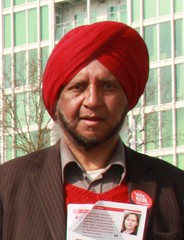 A GREENWICH Council Cabinet member is secretly campaigning to overhaul the leadership structure at the council, Greenwich.co.uk can reveal.
A GREENWICH Council Cabinet member is secretly campaigning to overhaul the leadership structure at the council, Greenwich.co.uk can reveal.
Days after it emerged Cabinet member Cllr Rajwant Sidhu would be leaving the Cabinet following Labour’s internal elections, the internet name DemocracyGreenwich.co.uk was registered – with Cllr Sidhu’s address listed in the domain’s registration details.
The website name redirects to an online petition calling on the authority to change from the current ‘leader and cabinet’ system to a committee system in order to “bring Power back to the People.”
Although DemocracyGreenwich.co.uk is not registered to Councillor Sidhu by name, a Land Registry search revealed that the domain registrant’s address belongs to the Woolwich Common councillor.
Councillor Sidhu refused to either confirm or deny his role in the campaign when contacted by Greenwich.co.uk.
When asked whether he had set up DemocracyGreenwich.co.uk, he replied that “this is not something which I can comment on.”
Greenwich.co.uk revealed last week that Cllr Sidhu would be exiting the Cabinet at the council’s AGM next month. In a move which has left some local Labour members “fuming” according to 853, he is to be replaced by Cllr Harry Singh.
The committee system that ‘Democracy Greenwich’ are calling for limits the direct power of the council leader and would give greater powers of scrutiny and decision-making to individual councillors.
The committee system was commonly used by local authorities until the introduction of the Local Government Act 2000.
A local referendum can be called on changing the leadership structure of a local authority if 5% of local electors petition for it. However, the new Localism Act gives councillors the power to change the system themselves without the expense of a referendum, by way of a majority vote on the council.
Two local authorities including the London Borough of Sutton recently voted to revert to a committee system.
The campaign to reform Greenwich Council is being led by members of the local Labour Party who are believed to be unhappy about the powers held by the current leadership.
Controversial changes to local masterplans are also thought to be a key factor, with some local party members believing that the proposals are being “forced through” by the leadership.
One senior party figure willing to put his name to the campaign is the chairman of Greenwich and Woolwich Labour Party David Gardner. Gardner was one of the first signatories on the petition, but could not be reached for comment today.
The Conservative group on the council withdrew a motion at the last full council meeting calling for a change to the leadership structure after Chris Roberts said that officers were already looking at the proposals.
Why did Councillor Sidhu have to do this ‘secretly’? However, I do feel there is a need for change… a big change.
I agree, Karin.
Cllr Sidhu is not doing this campaign any favours with this secrecy.
This might explain Cllr Sidhu’s desire for secrecy:
“Councillors can face sanctions from the London Labour Party for speaking against the party line, even on the most minor of disagreements.”
From Darryl at 853
http://853blog.com/2012/04/16/democracy-greenwich-campaign-launches-how-you-can-help/
I was Leader of the Opposition in LB Lewisham when they ended the committee system of governance there and introduced the cabinet system and then the directly elected mayor system. I now live in LB Greenwich (sorry … RB Greenwich).
I strongly opposed these changes, and having seen how they have worked out my only regret is that I did not oppose them even more strongly.
When I was a councillor during the time the committee system operated, I gained a very good understanding of how the council worked through sitting on its committees. Through the papers presented I had a good view of what the council was doing, and I met many of the officers of the council building a good relationship with them. While the major thrust of the council’s work was directed by the majority party, so of course I would be outvoted if there was a big contentious issue, most committee business is not like this. I fe;t that despite being a minority group councillor in a council dominated by the majority party I could still make a valuable contribution throiugh the committee system.
Once the cabinet system was brought in, I found being a councillor was a joke. The supposed “scrutiny” committees just seemed to be an attempt to keep councillors who were not in the cabinet busy doing not very much. The loss of information which came from no longer having access to the committee papers that I used to work with and the cabinet papers holding a fraction of the data that used to be made public, was immense. I was often embarrassed to deal with my constituents because they expected me to know what the council was doing in order to be able to work on their behalf, but I just didn’t. They would come to me with issues about things the council was doing and I would have to say “Sorry, I did not know that was happening”.
This was one of the reasons I decided not to stand again as a councillor when my third term was up in 2006. The end of the committee system made it a waste of time.
I find it worrying that those who speak against the party line could face sanctions. What does this say about the Labour Party (or any party?) that does not seem to stand for the people and does not tolerate free speech? What does a party stand for if not for the people?